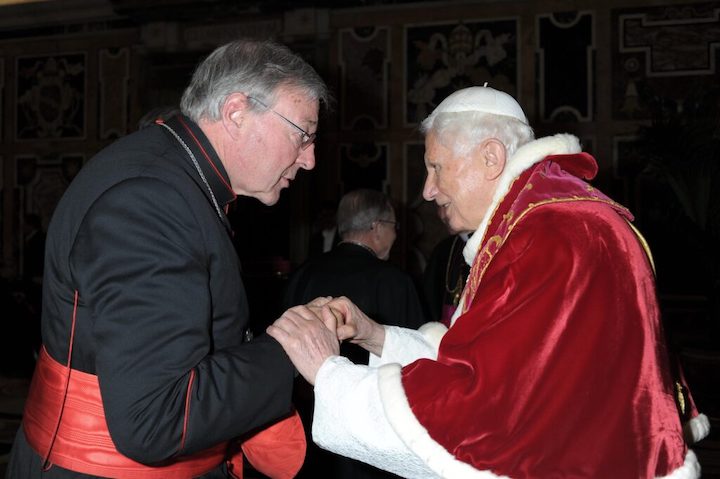- Feb 5, 2002
- 166,678
- 56,288
- Country
- United States
- Faith
- Catholic
- Marital Status
- Married
- Politics
- US-Others
Midway through the first volume (2019) of his Prison Journal, Australian Cardinal George Pell records that: “Every type of Catholic should realise that there is an exclusion zone around the Eucharist, where adults without faith and without basic good practice should not enter. Years ago, a prominent criminal who was in jail was known to be Catholic. ‘Does he come to the jail Masses?’ the chaplain was asked. ‘Yes’ was the reply. ‘Does he receive Communion?’ The chaplain explained, ‘No, he doesn’t because he has faith.’”
Pell had much more to say about the Mass and Holy Eucharist in other contexts, as did Pope Benedict (see especially his masterpiece The Spirit of the Liturgy). Indeed, they both sensed that recovering a deep reverence for the Sacrament, “the source and summit” of the Christian life (Vatican II), would also resolve many vexed questions in the Church. And no small number in the contemporary world.
It’s in that deeper context that we need to appreciate texts that recently surfaced by or about these two great churchmen, who just died ten days apart, rather than in the adolescent media frenzy over what are always rather sordid – and now rather tiresome – Vatican politics.
There’s much heat, to be sure, in two brief essays by Pell: one that appeared in the London Spectator the day after he died (he expected to be alive at its publication) calling the tangled mess of the Synod on Synodality “a toxic nightmare” (here); and the other a tart memo that had been circulating among the Cardinals since March under the pseudonym “Demos” (here), now believed to be his. What matters most, however, is not the soap opera clash with figures in the Vatican – including the pope – but the clarity and force Pell brings to the nature of what Christ bequeathed to us in the sacraments and sacred doctrine.
Continued below.

 www.thecatholicthing.org
www.thecatholicthing.org
Pell had much more to say about the Mass and Holy Eucharist in other contexts, as did Pope Benedict (see especially his masterpiece The Spirit of the Liturgy). Indeed, they both sensed that recovering a deep reverence for the Sacrament, “the source and summit” of the Christian life (Vatican II), would also resolve many vexed questions in the Church. And no small number in the contemporary world.
It’s in that deeper context that we need to appreciate texts that recently surfaced by or about these two great churchmen, who just died ten days apart, rather than in the adolescent media frenzy over what are always rather sordid – and now rather tiresome – Vatican politics.
There’s much heat, to be sure, in two brief essays by Pell: one that appeared in the London Spectator the day after he died (he expected to be alive at its publication) calling the tangled mess of the Synod on Synodality “a toxic nightmare” (here); and the other a tart memo that had been circulating among the Cardinals since March under the pseudonym “Demos” (here), now believed to be his. What matters most, however, is not the soap opera clash with figures in the Vatican – including the pope – but the clarity and force Pell brings to the nature of what Christ bequeathed to us in the sacraments and sacred doctrine.
Continued below.

Dead Men Do Tell Tales - The Catholic Thing
Robert Royal on the questions and criticisms of certain pronouncements of Pope Francis raised by Benedict XVI and Cardinal George Pell.
